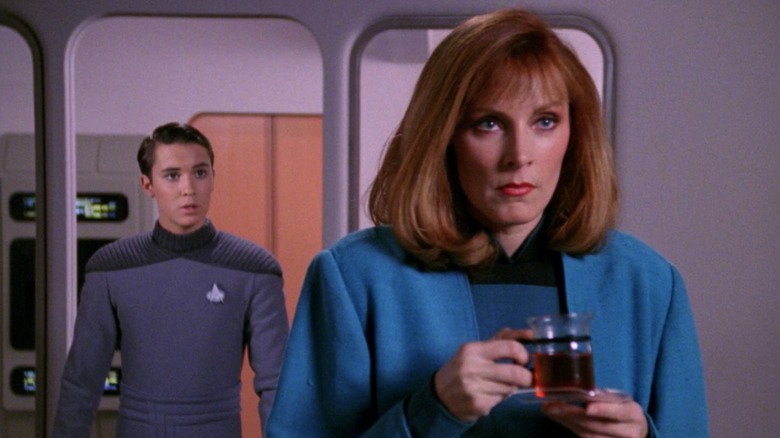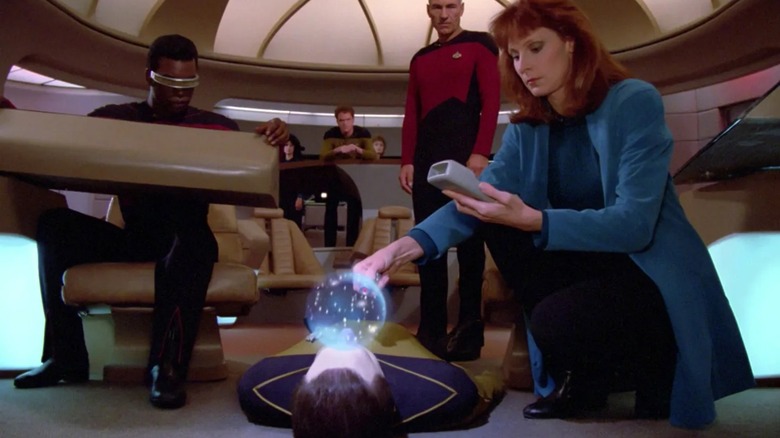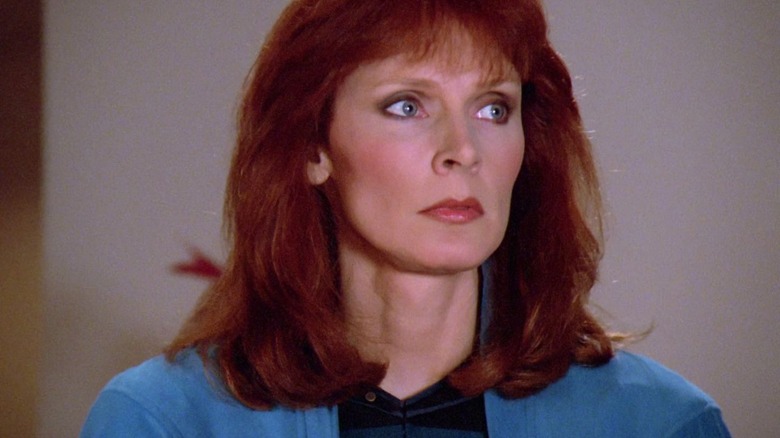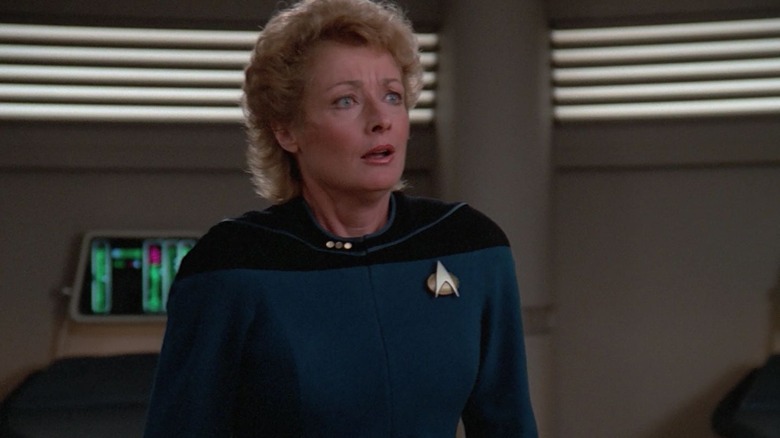Why Star Trek Cut Beverly Crusher From The Next Generation Season 2
In the first season of "Star Trek: The Next Generation," the chief medical officer on board the U.S.S. Enterprise-D was Dr. Beverly Crusher (Gates McFadden), a fearlessly moral, mature character who was already at the peak of her professional career. Dr. Crusher was a great character as she was always eager to speak her mind and always knew where she stood on any ethical issues. Unlike many other characters on the show, who were still discovering their humanity, their career tracks, or their identity, Dr. Crusher had already arrived, as it were. She was one of the few "adults" on the show.
She was also hated by one of the "Next Generation" producers, Maurice Hurley. As Trekkies likely know, the first season of "Next Generation" was a tumultuous time behind the scenes, with show creator Gene Roddenberry, his personal lawyer Leonard Maizlish, and multiple other showrunners and producers jockeying for control of the project. The chaotic journey of the show's first two seasons is detailed marvelously in William Shatner's 2014 documentary "Chaos on the Bridge." Hurley not only disliked Dr. Crusher, but had a wholly antagonistic relationship with McFadden. When Murley was made the showrunner for the show's second season, he fired McFadden outright.
Dr. Crusher took a job at Starfleet Medical and was replaced on the Enterprise by Dr. Kate Pulaski (Diana Muldaur), a more curmudgeonly, Dr. McCoy-type of character. Fans weren't fond of Pulaski. For the show's third season, Hurley was fired and McFadden was brought back.
There are many behind-the-scenes stories about McFadden's absence from the second season of "Next Generation," with some of them documented in the oral history book "The Fifty-Year Mission: The Next 25 Years: From The Next Generation to J.J. Abrams," edited by Mark A. Altman and Edward Gross.
The various stories
Susan Sackett, Gene Roddenberry's personal assistant and longtime girlfriend, recalled that McFadden and Patrick Stewart, who played Captain Jean-Luc Picard, didn't act well together. This seems to be a dubious claim, as the two actors always appeared to have marvelous chemistry on screen, but Sackett felt that McFadden was let go because of some bad scenes. She also noted that McFadden was brought back for season 3 because Muldaur was never comfortable with the show's propensity for multisyllabic technobabble, despite having appeared on "Star Trek" in the 1960s. Sackett said:
"I don't think she and Patrick worked well together. It was mainly his request. There were some acting conflicts. Some actors work better with other actors. Then they tried Diana Muldaur, but she couldn't remember her lines because she had a lot of technical things to say, so they brought back Gates. Gene had worked with Muldaur, so he was fond of her and thought she'd do a good job, but this wasn't the right role for her."
"Next Generation" executive producer Rick Berman, however, refuted Sackett's claim, saying "Patrick had absolutely nothing to do with it," and that it was all about the irrational hate Hurley had for McFadden. Berman can't say why Hurley hated McFadden so much, just that he hated both the character and the actress and that was that. "He didn't like her acting and he didn't like her," Berman said. Berman theorized that Hurley was determined to throw his weight around, as he was one of the few producers who managed to survive from season 1 into season 2. To Berman's eye, firing McFadden was largely an embittered ego maneuver on Hurley's part.
The fragile Maurice Hurley
As Berman recalled:
"[Hurley] went to me at the end of season one, and I said I thought it was a bad idea. Then he went to Gene and he managed to convince Gene. It was all part of the fact that he was the last man standing at the end of the first season and he was going to be moving into the second-biggest chair over in the writing area next to Gene. This was a request he was making, and Gene decided he would honor it. So, Gates was let go and we went through a whole casting procedure and ended up with Dr. Pulaski, who was played by Diana Muldaur."
McFadden, meanwhile, has gone on record several times about her firing and her bizarre rivalry with Hurley. McFadden had noted that she wasn't into playing politics or thinking of acting as a business. She was always a lot more passionate about the craft itself. So when she butted heads with a producer on a major studio's TV franchise, it felt to her like two warring worlds were colliding. Unlike in theater, which McFadden saw as warm and collaborative, studio TV productions were rife with personal politics. She was unprepared to face her craft on those terms, and, by her estimation, that's what got her into "trouble," so to speak.
For instance, she would come to Hurley with questions as to Dr. Crusher's role in the life of her son, Wesley Crusher (Wil Wheaton). Why, she wondered, did Wes always go to the show's many male characters for advice and never to his mom? Also, why did anyone think to write the script for the sexist episode "Angel One?"
When McFadden asked these questions, she saw it pissed off both Hurley and Roddenberry.
Muldaur's side
McFadden's observations about "Next Generation" being a bog of ego and personal politics were confirmed by Diana Muldaur. In "The Fifty-Year Mission," the actress had an interesting analogy, comparing her work on "Star Trek" to the tone on the set of her season on "Next Generation." It seemed that everything was copacetic in the 1960s, but cutthroat in the 1980s. She compared it to her experiences acting in full-scale Broadway productions, and how they differed from smaller, Off-Broadway productions. Her analogy ran:
"I found on Broadway there to be no tension; everyone there was good, worked hard, and everyone made a product, whether it went on well or not. Off-Broadway, there were stabbings, knifings; it was totally different. You had to go to the right school, you had to study at the studio to get a job, you had to be part of a group. The original 'Star Trek' felt like doing a nice Broadway play. And 'Next Generation' was Off-Broadway, it was everyone trying to be somebody, rather than just letting it all happen and letting it go and just being there and acting wonderfully."
She noted, "If there was any tension, it had not to do with me, it had to do with them."
Muldaur ultimately didn't really like working on "Next Generation," noting that "all the directors were kids," and that the show was "all tech," lacking in creativity and humanity. She also mentioned that she had trouble remembering her lines, confirming Sackett's story. When Muldaur decided to leave the show, it seemed that the feeling was mutual.
That may have been for the best. As Berman explained, "When Hurley left at the end of season two, the very first thing I did was to rehire Gates. I mean, literally, the day Hurley left, Gates was rehired."



